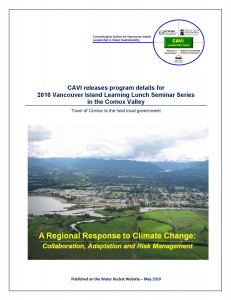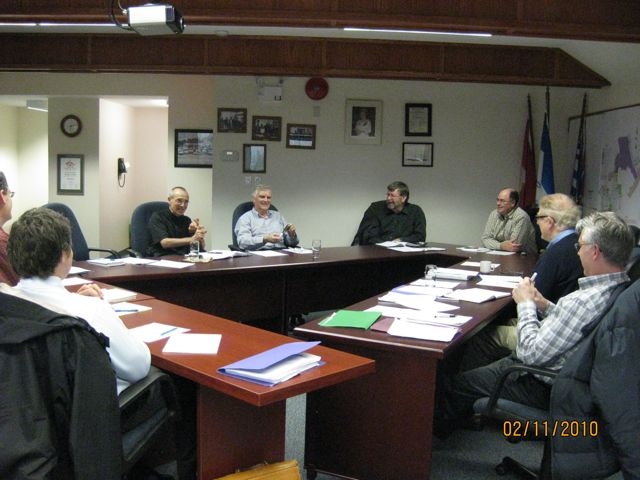CAVI releases program overview for 2010 Vancouver Island Learning Lunch Seminar Series in the Comox Valley
Note to Readers:
The article below provides preliminary information on the 2010 Learning Lunch Seminar Series that is being organized by Convening for Actlon on Vancouver Island (CAVI) in collaboration with the Town of Comox and the three other Comox Valley local governments (City of Courtenay, Village of Cumberland and Comox Valley Regional District.
The 2010 Series will comprise three monthly seminars during the September-October-November period. Dates will be announced in July. Because the 2010 Series will be open to local governments outside the Comox Valley, this will provide an opportunity for cross-fertilization of experience related to implementation of regional strategies and plans.
 This article provides context by providing an overview of the 2008 and 2009 series and how they have provided the foundation for ‘talent development’ in the Comox Valley; describing the ‘regional team approach’ that is driving inter-governmental collaboration; and introducing the learning outcomes that frame A Regional Response to Climate Change.
This article provides context by providing an overview of the 2008 and 2009 series and how they have provided the foundation for ‘talent development’ in the Comox Valley; describing the ‘regional team approach’ that is driving inter-governmental collaboration; and introducing the learning outcomes that frame A Regional Response to Climate Change.
To download a report-style, PDF version of the article below, click on CAVI releases program overview for 2010 Vancouver Island Learning Lunch Seminar Series in the Comox Valley
“Collaboration, Adaptation and Risk Management – A Regional Response to Climate Change”
Team-building is a cumulative process. The Comox Valley is in the third year of the Learning Lunch program. After the City of Courtenay hosted the 2008 Series, the Comox Valley Regional District hosted the 2009 Series. The Town of Comox is host for the 2010 Series.
Successive Comox Valley series have employed provincial guidance documents, guests from other regions, on-the-ground examples, walkabouts, and town hall sharing sessions to stimulate discussion of HOW to achieve water sustainability by implementing green infrastructure policies and practices.
The Comox Valley is a microcosm of what is happening throughout BC. Lessons learned there in balancing settlement change and ecology can be applied elsewhere. A key goal is to enable communities to realize more benefits than liabilities from the development that takes place.
Developing Talent
“In 2008, the Comox Valley regional team initiated a process that we now call developing talent,” states Tim Pringle, Director of Special Programs for the Real Estate Foundation, a  primary funder of the CAVI program.
primary funder of the CAVI program.
“To create the desired future, it is essential that communities declare their values and develop talent; and that is what the Learning Lunch program is doing for the Comox Valley.”
“The Comox Valley team comprises talented people who would do more if they could. They are developing the talent to go on a journey to jointly use their capability to manage the community more effectively than in the past. The regional team approach will help them get there. Their willingness to work together is impressive.”
From ‘Boundaries’ to ‘Commonalities’
 “Man imposes his own boundaries. So, we have an issue of inconsistencies … or incongruities … between natural and imposed boundaries which sets up a series of problems. Our challenge is to work around and with boundaries. Our goal in moving forward with a ‘regional team approach’ is to shift the paradigm from boundaries to areas of commonality,” states Derek Richmond, Manager of Engineering for the City of Courtenay.
“Man imposes his own boundaries. So, we have an issue of inconsistencies … or incongruities … between natural and imposed boundaries which sets up a series of problems. Our challenge is to work around and with boundaries. Our goal in moving forward with a ‘regional team approach’ is to shift the paradigm from boundaries to areas of commonality,” states Derek Richmond, Manager of Engineering for the City of Courtenay.
The Four Cs
“For the regional team approach to be truly successful, we simply must think of ourselves as a team, not as individuals within silos; and we need to break down boundaries through communication, collaboration, cooperation and coordination.”
“In the Comox Valley, we now have a great opportunity to move ahead with implementing the real elements of ‘integrated planning’. We have recognized the need, realized the benefits, talked about examples of where this has happened and we are coming to grips with more clearly defined ways of how to facilitate this on an ongoing and consistent basis,” summarizes Derek Richmond in providing context for the 2010 Series.
A Regional Response to Climate Change Explained
 “Watershed-based land use planning has real meaning on the ground for the Town of Comox,” states Glenn Westendorp, Chair of the 2010 Learning Lunch Series and Public Works Superintendent for the Town. “Because Comox is downstream of future developments located within the regional district, we require a unified and consistent regional approach to rainwater management and green infrastructure.”
“Watershed-based land use planning has real meaning on the ground for the Town of Comox,” states Glenn Westendorp, Chair of the 2010 Learning Lunch Series and Public Works Superintendent for the Town. “Because Comox is downstream of future developments located within the regional district, we require a unified and consistent regional approach to rainwater management and green infrastructure.”
2010 Learning Lunch Series
“The Series theme, A Regional Response to Climate Change, defines the desired outcome. This shows how far we have come as a regional team in three years. We are ready to establish performance targets for integrated land and water management.”
“At the end of 2010, the four local governments will prepare a Joint Report for our politicians. We will summarize tangible outcomes from the 3-year program. That will be their moment to endorse an holistic approach to green infrastructure, one that integrates rainwater and drought management strategies. The Comox Valley planners already have a Memorandum of Understanding for review of land development proposals. This MOU has established a precedent for inter-governmental collaboration,” concludes Glenn Westendorp.
Program Overview
“The Province’s Living Water Smart and Green Communities initiatives provide a framework for ‘convening for action’ in order to improve the way that land is developed and water is used in BC,” states Glen Brown, Executive Director for the Local Government Infrastructure  and Finance Division within the Ministry of Community & Rural Development. He is a member of the organizing team for the 2010 Series.
and Finance Division within the Ministry of Community & Rural Development. He is a member of the organizing team for the 2010 Series.
“Comox Valley collaboration is a provincially significant initiative. The 2010 Series will serve as a springboard beyond the Comox Valley in order to contribute to water sustainability in the Georgia Basin.”
The Water Challenge
“The 2010 Series will build on the foundation provided by the two previous series. It comprises three seminars that will be built around three themes: Collaboration, Adaptation and Risk Management.,” explains Glenn Westendorp.
 “Water is a key component for all the regional strategies that we are currently developing simultaneously. All will have to be integrated into one plan. At the core is growth – we are bringing these strategies together in 2010 to manage growth. We will be looking at all aspects of water,” continues Kevin Lorette, General Manager of the Property Services Branch in the Comox Valley Regional District.
“Water is a key component for all the regional strategies that we are currently developing simultaneously. All will have to be integrated into one plan. At the core is growth – we are bringing these strategies together in 2010 to manage growth. We will be looking at all aspects of water,” continues Kevin Lorette, General Manager of the Property Services Branch in the Comox Valley Regional District.
“When we move into the action phase, it will not be one organization doing it. This involves everybody. Job functions will be modified so that everyone has a role in implementation. If we all work together, we will be that much more effective.”
To Learn More:
To download a copy of the Program Overview, click here. This 4-page document provides an outline of what each seminar will cover. Seminar #1 will start where the 2009 Series ended. To learn more about the 2009 Series, in particular the inter-regional sharing and outcomes, click here.
Posted May 2010




